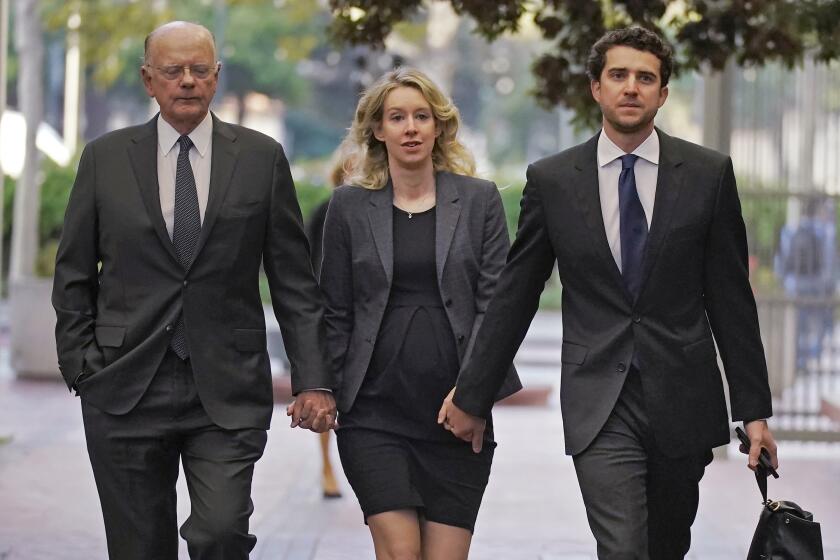Winging It
- Share via
A potential strike against Northwest Airlines Corp. already has disrupted travel plans for more than 25,000 people and threatens to cause problems for tens of thousands more this weekend.
Northwest’s 6,200 pilots are set to strike Friday at 9:01 p.m. PDT unless their union, the Air Line Pilots Assn., reaches a last-minute agreement with the company. The parties were still negotiating late Wednesday.
A walkout would shut down Northwest--the fourth-largest domestic airline with 12% of the traffic handled by U.S. carriers--and snarl the travel system during its hectic, end-of-summer season.
Northwest, which carries an average of 150,000 people a day, has 1,700 daily flights serving about 160 cities in 23 countries. It’s also a leading U.S. carrier to Japan and other Pacific Rim destinations.
A strike would be acutely felt at major California airports, because Los Angeles and San Francisco are gateways for Northwest’s busy service to Asia. Northwest’s domestic hubs at airports in Minneapolis/St. Paul (where the airline is headquartered), Detroit and Memphis, Tenn., also would be hard hit.
Northwest, saying it wanted to “minimize confusion” in the event of a strike, canceled 400 flights scheduled for Friday and Saturday so that the 25,000 passengers booked on those flights can make alternate plans. The Saturday flights will be canceled even if a strike is averted. They include flights between Los Angeles and Tokyo, and between Orange County and Detroit.
No other flights are expected to be canceled ahead of a strike, Northwest added.
Many customers already had defected from Northwest for fear of a strike. Rival carriers, such as industry leader United Airlines--a unit of UAL Corp. and Northwest’s main U.S. competitor on Asian routes--said their bookings jumped in recent days as people holding Northwest reservations switched flights.
“We have seen an increase in bookings across the board, including transpacific routes,” said United spokeswoman Mary Jo Holland.
The nation’s travelers last prepared for an airline strike 18 months ago, when contract talks broke down between American Airlines, the nation’s second-largest carrier and a unit of AMR Corp., and its 9,300 pilots.
American’s pilots actually walked out for a few minutes on the eve of the Presidents Day holiday weekend. But President Clinton then invoked a rarely used emergency measure that ordered the pilots back to work while a presidential panel reviewed the dispute.
It is unclear whether the president would do the same at Northwest. Although a shutdown of Northwest would cause problems coast to coast, it likely would not be as disruptive as a strike against American, which controls 20% of the U.S. airlines’ market.
A White House spokesman said Wednesday that Clinton has not yet decided whether he would intervene, adding, “We want them to resolve their differences at the bargaining table.”
After the American Airlines action, Clinton administration officials emphasized that the move was not meant to set a precedent. Northwest has quietly urged the White House to step in anyway if a strike occurs, but ALPA and several Democratic House members have asked the president to stay clear.
Northwest contends that a strike would “be a disaster” for the traveling public, and it predicts that nearly 70,000 passengers would be stranded on the first day of the walkout.
ALPA contends those figures are inflated because they do not account for passengers now making alternate arrangements.
Northwest shares, which hit a 52-week low of $28.50 last week, fell 44 cents in Nasdaq trading on Wednesday, closing at $29.06.
Northwest and ALPA have been haggling over a new contract for two years but have failed to agree on wages, work rules or job protection. Northwest’s pilots earn an average of $120,000 a year.
The dispute is rooted in the strong recovery of Northwest, and the industry generally, over the last four years. In the early 1990s, Northwest and other carriers were struggling, and Northwest nearly sought protection in bankruptcy court. But it survived, thanks largely to $886 million worth of labor concessions from its workers.
Now, with Northwest and the industry chalking up record profits, employees want those concessions repaid and they want parity with workers at other major airlines.
Meanwhile, Northwest is making arrangements for other carriers to accept its passengers if a strike occurs.
But with most carriers flying jam-packed planes these days, it is doubtful that all of Northwest’s passengers could immediately find seats elsewhere for domestic flights.
(BEGIN TEXT OF INFOBOX / INFOGRAPHIC)
Carrying Forward
Northwest Airlines is the fourth-largest domestic carrier based on revenue passenger miles, an industry benchmark that measures passenger traffic. Market share for the leading U.S. carriers in 1997.
United: 20.0%
American: 17.7%
Delta: 16.5%
Northwest: 12.0%
Continental: 7.3%
US Airways: 6.9%
Southwest: 4.1%
Source: Air Transport Assn.
More to Read
Inside the business of entertainment
The Wide Shot brings you news, analysis and insights on everything from streaming wars to production — and what it all means for the future.
You may occasionally receive promotional content from the Los Angeles Times.











